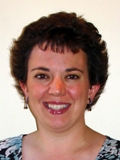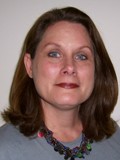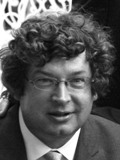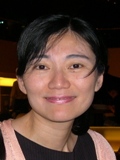|
Honors
College director chairs panel at conference
Rebecca Oliver, director, Honors College, participated in a panel at the 45th annual
conference of the National Collegiate Honors Council (NCHC) in
Kansas Ci ty, Mo., in October. She served as moderator for the panel
entitled “Honors Housing: Living-Learning Communities and Creative
Programming.” Oliver, along with colleagues from the University of
Florida, Western Illinois University, and West Virginia University,
discussed their collaborative work with living-learning communities
and the students they serve on their respective campuses. The
Honors Living-Learning Community (HLLC) at Arkansas State University
opened in August 2009 as a partnership between Student Affairs
(Residence Life) and Academic Affairs (The Honors College). ty, Mo., in October. She served as moderator for the panel
entitled “Honors Housing: Living-Learning Communities and Creative
Programming.” Oliver, along with colleagues from the University of
Florida, Western Illinois University, and West Virginia University,
discussed their collaborative work with living-learning communities
and the students they serve on their respective campuses. The
Honors Living-Learning Community (HLLC) at Arkansas State University
opened in August 2009 as a partnership between Student Affairs
(Residence Life) and Academic Affairs (The Honors College).
Dr. Relyea, Dr. Guha, Dr. Fish
present article at conference
Dr. Clint Relyea, Management, and coordinator, International
Business program, Dr. Gauri S. Guha, International Business
and Economics, and Dr. Kelly E. Fish, International Business
and Computer Information Technology, recently wrote an article, “Insights Into Undergraduate IB Curriculum Development.” This article was presented in October by Dr. Fish at the
International Academy of Business and Public Administration
Disciplines Conference held in New Orleans.The IABPAD strives to
promote excellence in public administration and all business
disciplines including accounting, economics, education, finance, and
marketing.
Fowler elected
president of association
Dr. Gil
Fowler, chair, Journalism, has been elected President
of the 1,000+ member Western Social Science Association (WSSA). Founded in
1958, WSSA seeks to foster professional study, to advance research,
and to promote the teaching of the social sciences. Each year in
April, 750+ social scientists gather for the association's annual
conference. At a typical conference held over three and one-half
days, participants, organized in some 30 sections and affiliated
groups, present 800 papers at 300 disciplinary and interdisciplinary
panel sessions. As vice president, Dr. Fowler organized the 2010
conference held in Reno, NV where more than 700 papers in 140
sessions were presented. This year’s
conference is scheduled for April 13-16, 2011 in Salt Lake City,
Utah. WSSA draws on scholars and others in some 30 disciplines, or
“sections,” from across the United States, Canada, and Mexico;
convenes an annual conference; conducts research competitions for
faculty and students; and publishes The Social Science Journal, a
juried, quarterly research journal, and WSSA News, the Association’s
newsletter, three times a year. The theme for
the 2011 conference is “The Social Sciences: Addressing Questions
that Matter.” Students and/or faculty interested in making
individual or group presentations may contact Dr. Fowler for submission
information. Deadline for submissions is Dec. 3, 2010. sciences. Each year in
April, 750+ social scientists gather for the association's annual
conference. At a typical conference held over three and one-half
days, participants, organized in some 30 sections and affiliated
groups, present 800 papers at 300 disciplinary and interdisciplinary
panel sessions. As vice president, Dr. Fowler organized the 2010
conference held in Reno, NV where more than 700 papers in 140
sessions were presented. This year’s
conference is scheduled for April 13-16, 2011 in Salt Lake City,
Utah. WSSA draws on scholars and others in some 30 disciplines, or
“sections,” from across the United States, Canada, and Mexico;
convenes an annual conference; conducts research competitions for
faculty and students; and publishes The Social Science Journal, a
juried, quarterly research journal, and WSSA News, the Association’s
newsletter, three times a year. The theme for
the 2011 conference is “The Social Sciences: Addressing Questions
that Matter.” Students and/or faculty interested in making
individual or group presentations may contact Dr. Fowler for submission
information. Deadline for submissions is Dec. 3, 2010.
Dr. Owens publishes article in
international journal
Dr. Deborah Owens,
Reading, has published an article which will appear in the Nove mber issue of the international journal Literacy. The
article, "Commercial Reading Programmes as the Solution for
Children Living in Poverty," describes Dr. Owens’ research regarding
the use of a scripted commercial reading program in classrooms
serving low socio-economic struggling readers in kindergarten and
first grade demonstration classrooms in Mississippi. The scripted
commercial program was found to be inadequate in meeting the needs
of the students and suggests the need for educational policy-makers
to consider the social and cultural contexts of learners as well as
the need to empower teachers to exercise professional judgment when
making decisions about what and how to teach their students. mber issue of the international journal Literacy. The
article, "Commercial Reading Programmes as the Solution for
Children Living in Poverty," describes Dr. Owens’ research regarding
the use of a scripted commercial reading program in classrooms
serving low socio-economic struggling readers in kindergarten and
first grade demonstration classrooms in Mississippi. The scripted
commercial program was found to be inadequate in meeting the needs
of the students and suggests the need for educational policy-makers
to consider the social and cultural contexts of learners as well as
the need to empower teachers to exercise professional judgment when
making decisions about what and how to teach their students.
Dr. Brown cited in Slate magazine for
research article
Dr. Chris Brown, Economics, was cited in a recent article in Slate
magazine. The article, "The
United States of Inequality," was
part of a series by Timothy Noah. Noah looked at wheth er race,
gender, or the breakdown of the nuclear family affected income
inequality. Noah then explored immigration, the technology boom,
federal government policy, the decline of labor unions,
international trade, America's ultra-wealthy class, and thedecline
of K-12 education. In conclusion, Noah explained why income
inequality cannot be ignored. See the complete series in pdf. The
section, "Inequality isn't Increasing" cites Dr. Brown, along with
David Moss of Harvard Business School and Princeton's Paul Krugman.
Noah cites Dr. Brown's "Does
Income Distribution Matter for Effective Demand? Evidence from the
United States" (Review of Political
Economy, Vol. 16, No. 3, 291-307, July 2004), in which Brown
affirmed that "inequality can exert a significant drag on
effective demand." Reducing inequality, he argued, would also reduce
consumer debt. Noah remarks that today, Brown's paper looks
prescient. er race,
gender, or the breakdown of the nuclear family affected income
inequality. Noah then explored immigration, the technology boom,
federal government policy, the decline of labor unions,
international trade, America's ultra-wealthy class, and thedecline
of K-12 education. In conclusion, Noah explained why income
inequality cannot be ignored. See the complete series in pdf. The
section, "Inequality isn't Increasing" cites Dr. Brown, along with
David Moss of Harvard Business School and Princeton's Paul Krugman.
Noah cites Dr. Brown's "Does
Income Distribution Matter for Effective Demand? Evidence from the
United States" (Review of Political
Economy, Vol. 16, No. 3, 291-307, July 2004), in which Brown
affirmed that "inequality can exert a significant drag on
effective demand." Reducing inequality, he argued, would also reduce
consumer debt. Noah remarks that today, Brown's paper looks
prescient.
Dr. Chu edits criminology text in multi-volume set
Dr. Doris Chu,
Criminology, published a book in October. The book that she
edits is entitled “Crime and Punishment Around the World, Vol.3.
Asia/Pacific” (Santa Barbara: ABC-CLIO). Dr. Chu has edited the Asia/Pacific volume of
this multi-volume book set titled “Crime and Punishment around the
World” for the past three years.The book set includes a volume for
each of four world regions: Africa, Americas, Asia/Pacific, and
Europe. General editor for the series is Graeme Newman. The Asia/Pacific volume
includes chapters with information concerning crime and punishment
covering 61 countries (regions). The chapter entry for each country
contains information on historical, legal, and political
contexts of the criminal justice system, along with sections on crime
(classification of crimes and crime statistics), criminal justice
procedures (investigation, trial stages, and sentencing), and
punishment (types of punishment, prison and its extent, including
statistics; death penalty; alternatives to punishment). Local
crimes that have international implications or links to organized
crime such as drug trafficking, human trafficking, money laundering,
cross border crime, kidnapping and terrorism are also featured. The
volume also includes information of the most challenging crimes
faced by individual countries. Importantly, this book fills a gap
in the literature. Prior to its publication, there were few, if
any, reference sources available regarding international crime and
punishment, and certainly nothing this extensive. This series should
become an important source of international information about crime
and punishment for a wide audience around the world. titled “Crime and Punishment around the
World” for the past three years.The book set includes a volume for
each of four world regions: Africa, Americas, Asia/Pacific, and
Europe. General editor for the series is Graeme Newman. The Asia/Pacific volume
includes chapters with information concerning crime and punishment
covering 61 countries (regions). The chapter entry for each country
contains information on historical, legal, and political
contexts of the criminal justice system, along with sections on crime
(classification of crimes and crime statistics), criminal justice
procedures (investigation, trial stages, and sentencing), and
punishment (types of punishment, prison and its extent, including
statistics; death penalty; alternatives to punishment). Local
crimes that have international implications or links to organized
crime such as drug trafficking, human trafficking, money laundering,
cross border crime, kidnapping and terrorism are also featured. The
volume also includes information of the most challenging crimes
faced by individual countries. Importantly, this book fills a gap
in the literature. Prior to its publication, there were few, if
any, reference sources available regarding international crime and
punishment, and certainly nothing this extensive. This series should
become an important source of international information about crime
and punishment for a wide audience around the world.
Back to the top |

